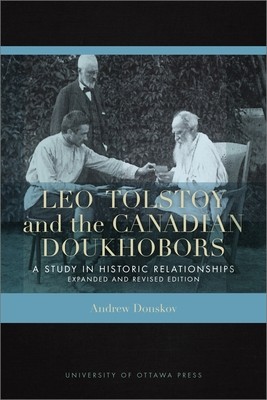
- We will send in 10–14 business days.
- Publisher: University of Ottawa Press
- ISBN-10: 077662850X
- ISBN-13: 9780776628509
- Format: 15.2 x 22.9 x 2.8 cm, minkšti viršeliai
- Language: English
- SAVE -10% with code: EXTRA
Leo Tolstoy and the Canadian Doukhobors (e-book) (used book) | bookbook.eu
Reviews
Description
Following the completion of his major novels, War and Peace and Anna Karenina, in 1880, Russian writer Leo Tolstoy experienced a spiritual crisis that led him to denounce the privileges of his social class and its attendant material wealth, and to embrace the simple rural life of the peasantry. In the persecuted Doukhobor sect, who also rejected militarism and church ritual in favour of finding God, he saw a prime example of how it was possible to live his new-found pacifist ideals in everyday life. He was so taken with their lifestyle, calling Doukhobors "people of the 25th century," that in 1898, he decided to help finance their emigration en masse to Canada, away from the persecutions of the Russian church and state.
[endif]
Andrew Donskov's expanded study presents an outline of Doukhobor history and beliefs, their harmony with Tolstoy's lifelong aim of "unity of people," and the portrayal of Doukhobors in his writings. This edition features Tolstoy's complete correspondence with Doukhobor leader Pëtr Vasil'evich Verigin and a timeline on Tolstoy and the Canadian Doukhobors today. The volume includes guest essays by prominent Canadian Doukhobors Jan Kabatoff, Eli A. Popoff, and Koozma J. Tarasoff.
Supported by a considerable array of source materials, Donskov's study will be of relevance to anyone interested in religious, philosophical, sociological, pacifist, historical or literary studies.
EXTRA 10 % discount with code: EXTRA
The promotion ends in 22d.01:51:09
The discount code is valid when purchasing from 10 €. Discounts do not stack.
- Publisher: University of Ottawa Press
- ISBN-10: 077662850X
- ISBN-13: 9780776628509
- Format: 15.2 x 22.9 x 2.8 cm, minkšti viršeliai
- Language: English English
Following the completion of his major novels, War and Peace and Anna Karenina, in 1880, Russian writer Leo Tolstoy experienced a spiritual crisis that led him to denounce the privileges of his social class and its attendant material wealth, and to embrace the simple rural life of the peasantry. In the persecuted Doukhobor sect, who also rejected militarism and church ritual in favour of finding God, he saw a prime example of how it was possible to live his new-found pacifist ideals in everyday life. He was so taken with their lifestyle, calling Doukhobors "people of the 25th century," that in 1898, he decided to help finance their emigration en masse to Canada, away from the persecutions of the Russian church and state.
[endif]
Andrew Donskov's expanded study presents an outline of Doukhobor history and beliefs, their harmony with Tolstoy's lifelong aim of "unity of people," and the portrayal of Doukhobors in his writings. This edition features Tolstoy's complete correspondence with Doukhobor leader Pëtr Vasil'evich Verigin and a timeline on Tolstoy and the Canadian Doukhobors today. The volume includes guest essays by prominent Canadian Doukhobors Jan Kabatoff, Eli A. Popoff, and Koozma J. Tarasoff.
Supported by a considerable array of source materials, Donskov's study will be of relevance to anyone interested in religious, philosophical, sociological, pacifist, historical or literary studies.


Reviews